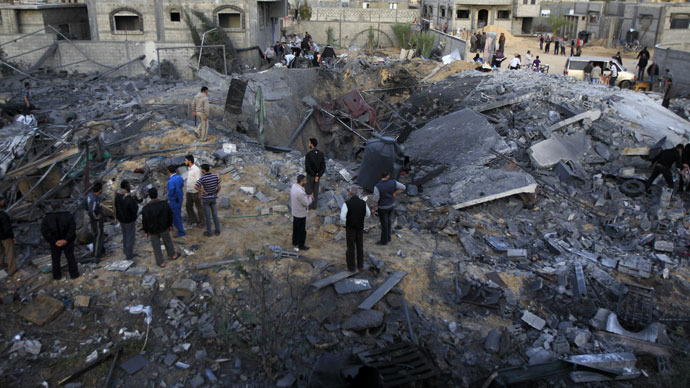Lessons of the Gaza ceasefire

As Egyptian Foreign Minister Mohamed Amr and US Secretary of State Hillary Clinton announced a much-awaited truce, ...
As Egyptian Foreign Minister Mohamed Amr and US Secretary of
State Hillary Clinton announced a much-awaited truce, the world saw
the birth of the most unusual, extraordinary ceasefire.
At first the chances for a ceasefire between Israel and Hamas –
which has came into effect Thursday night after eight days of a
bloody standoff in Gaza – looked pretty slim. But hope dies last.
Contrary to the war-mongering rhetoric, a deep-seated mistrust and
experts’ skepticism in diplomacy has finally prevailed and brought
its fruits. This time, the truce was brokered under the combined
efforts of “Islamists” and “Imperialists:” the new leadership of
post-Mubarak Egypt working in collaboration with
Washington.
The truce came as a gift from heaven, desired by the war-stricken Gaza like a miracle in the desert. Until the very last moment it looked like the Israeli airstrikes would continue, further leveling Palestinian homes and increasing the death toll among innocent civilians. There was every reason to believe that for Israel, the expansion of warfare in Gaza was only a matter of time – the question of “when,” but not “if.” Polls showed that 84% of Israeli citizens were speaking strongly in favor of the continuation of the IDF operation in Gaza, which as they understood it, should have not been limited to airstrikes. The dominant mood was that facing an existential threat, the Jewish nation should have followed the principle “Give the army the right to win,” the way it happened during the previous Israeli-Arab wars. Pacifist pledges from the few Israeli doves and the left were ridiculed, mocked or even labeled as treason.
Those sentiments were hardly surprising. The escalation of the
Gaza conflict in just days has bombed the Middle East back to the
age of Old Testament hatred and vendetta. With no quick end to the
standoff in sight, “An eye for an eye, a tooth for a tooth.” Moses'
adage sounded much louder than the mantras of modern diplomacy. A
comprehensive solution was very much in doubt as both sides showed
a rather tentative interest in exercising restraint.
What made the Israeli leadership stop halfway and make such a
turnaround? There should have been some very strong reason for
Prime Minister Netanyahu to wind up the whole thing. According to
Mrs. Clinton, it was Mr. Obama's intervention that played a
decisive role. According to Clinton, Netanyahu spoke with President
Obama and agreed to his recommendation to give a chance to a
ceasefire.
However, the Gaza ceasefire comes not just as President Obama's
sole achievement – it is his first major foreign policy achievement
after the reelection. It was a multi-lateral effort of world
diplomacy. Russia played quite a role. It is high time to recall
that hours before going to Israel, Clinton discussed the Gaza
crisis with Russia’s Foreign Minister Sergey Lavrov on the
sidelines of the ASEAN summit in Cambodia.
The guidelines of the Gaza ceasefire agreement echo Russia's initial proposals, which were spelled out by Russian envoy to the UN Vitaly Churkin while discussing a UN draft resolution on Gaza. What Moscow was initially calling for was an end to the violence by a negotiated ceasefire, support for international and regional efforts to settle the crisis peacefully and the resumption of talks between Palestinians and Israelis on a wider range of problems.
The Gaza crisis came as another crucial test for the world
community, which found itself deeply split on the conflict and the
ways it could be resolved, adding to the long list of international
rifts on Syria, Iran, etc. While the United States with its Western
allies unequivocally threw their weight to support Israel,
emphasizing that the Jewish state had the full right for self
defense in the wake of ongoing Hamas attacks, Iran, Turkey and a
large part of the vast Arab and Islamic world condemned Israel in
the strongest terms as the “Zionist aggressor” – and “malignant
tumor.”
Russia was on neither side of the barricades. Instead, it called
on the barricades to be demolished. I am not a great fan of Russian
foreign policy on some other issues, but Russia’s position on the
Gaza conflict sounds pragmatic, unbiased, and really deserving of
respect. In fact, Moscow showed the ability to resist the
temptation to take sides in the conflict – the temptation which was
so strong, as emotions were running so high. Moscow made itself
clear that it would have never agreed with a UN Security Council
resolution to selectively condemn Hamas while justifying Israeli
action (bad news for Israel).
At the same time, one will never find a single word of condemnation for Israel in Russia’s official statements on Gaza (probably, this would come as a major disappointment to Hamas and its fans who want to wipe Israel off the face of the Earth).
It is high time to explain the logic of Russia’s stand on the
Gaza conflict. Two weeks before the Pillar of Defense IDF operation
was launched, in the period from Nov. 1 to Nov. 15, more than 300
missies were fired from Gaza on the Israeli bordering cities of
Ashdod, Sderot, Ashkelon, Kiryat-Malahi and others.
Just imagine what could have happened, if one of Russia’s
neighbors, running insane or plotting cold-blooded provocation,
ever risked to provoke President Putin by firing three hundred
missiles at schools and hospitals in Southern Russian cities? If it
was not even 300, but 30, or, say, even three missiles
fired?
I believe that if attacked in such a way, Russia would have responded – and responded in a very strong way, showing zero tolerance. This is what the nation would have expected from its leadership. My observation is based on the Russian stand on such issues, which was made crystal clear by Vladimir Putin long ago: “There should be no talks with terrorists.” President Putin called on the army to wipe out Chechen rebels, caged like rats in their Caucasus mountain hideouts. But what is the basic difference between “Chechen rats” and “Gaza rats,” firing missiles at Israeli cities? Russia will never call freedom fighters those who are blowing up buses in Tel Aviv and are firing kassam missiles at Israeli cities.
Today there is a silver lining to clouds in Gaza conflict, and all sides should draw lessons from it. It will be grave mistake if they in Gaza interpret the truce as a major victory over Israel, which will only reinforce their efforts and resolve to launch fresh attacks on Israeli cities. For the second time, diplomacy might simply fail to deliver.
The statements, views and opinions expressed in this column are solely those of the author and do not necessarily represent those of RT.
The statements, views and opinions expressed in this column are solely those of the author and do not necessarily represent those of RT.












